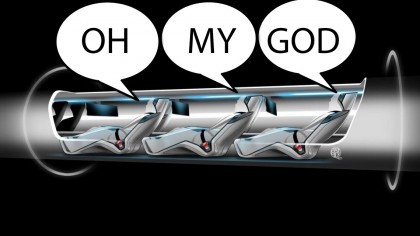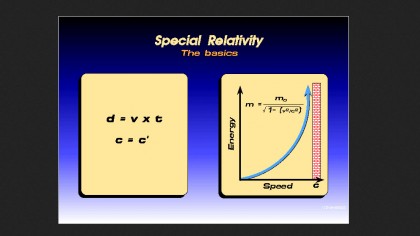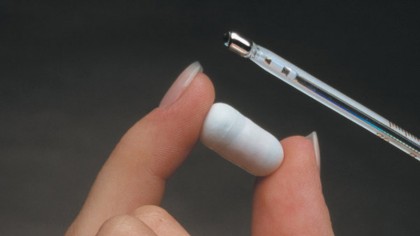10 bits of future tech we wish existed right now
Tech's boldest pledges examined
Sign up for breaking news, reviews, opinion, top tech deals, and more.
You are now subscribed
Your newsletter sign-up was successful

5. Proper artificial intelligence
Recently, we got wind of a computerised hand in Japan that could beat its human master at 'Rock, Paper, Scissors' 100 per cent of the time.
As infuriating as this would be to encounter (given our own practically flawless record), we shouldn't be worried about AI taking over quite yet. The fast-fingered cheat isn't self aware like a Terminator or Cylon, it's just quick enough to see us coming. And, as some researchers are, pointing out there's nothing approaching the presence of common sense from our silicon companions just yet.
Future thinkers point to the coming Technological Singularity when predicting the rise of the machines - the moment that human intelligence is surpassed by artificial intelligence. Ray Kurzweil reckons this happen in around 2045. Once we pass the critical mass, or so the theory goes, machine intelligence will grow at an exponential rate, computers will gain consciousness and start self-replicating and making decisions for themselves. If he's correct (most folks think its 2045 is very optimistic), then we're not sure even we want to be around.
6. The big, bold cashless society

The idea of giving up the almighty pound practically had millions of Brits belting out the Dad's Army the at the top of their lungs, a few years back. Can you imagine the reaction if we were forced to ditch it a unilateral 'Republican Credits' sort of currency like Bitcoin? Regardless of the multitude of ways companies like Google, Square, PayPal, Visa, Apple, Barclays and more are giving us ways to give up those scraggly bits of paper forever, our isn't going anywhere.
We're attached to our cash. Who wants a society where the government has a record of every single transaction? How would the elderly cope? What about off-the-clock businesses? Where we have to pay babysitters by bumping phones together? And how are we going to pay strippers… Ahem, how are people (not us) going to pay strippers?
7. Space elevators
Forget Richard Branson's sub-orbital flights. By the year 2100, renowned futurologist, he of wispy hair, Machio Kaku believes a space elevator made from grapheme (one of the only substances on earth that's stronger than diamond) will be able to cart us on a great big lift stretching beyond the earth's atmosphere.
The key to this, he believes, is nanotechnology, allowing us to create miles of graphene. Sadly, we won't be able to enjoy this Jack and the Beanstalk and 2001: A Space Odyssey mash-up.
Sign up for breaking news, reviews, opinion, top tech deals, and more.
8. The Star Trek Warp Drive

Now this might sound like an obvious one, but believe it or not, there are some dudes at NASA who think they've uncovered a potential formula for travelling at faster-than-light Warp Speed.
The researchers reckon by compressing the space in front of the craft and expanding the space behind the craft they could potentially create a bubble in which they could travel 10 times faster the speed of light. That would allow us us to reach other star systems in less than the 67,000 years it would presently take.
At the moment the warp bubble hypothesis is based around a mathematical loophole, so NASA is taking "very specific and controlled steps to create a proof of concept." Even if it does turn out to be possible, they've still got to figure out a way to power the thing…
9. Broken heart? Print a new one
More often than not we meet our end because one part or another has had enough of how poorly we treat it. The old ticker is often the culprit. However, what if, when one heart uses up its finite number of beats, you could replace it like a car engine? What if… we could rebuild ourselves? A group of researchers reckons it'll soon be possible to 3D print a fully functioning heart made from the patient's tissue, that can be transplanted with no risk of rejection.
"We think we can do it in 10 years - that we can build, from a patient's own cells, a total 'bioficial' heart," said Stuart Williams of the Cardiovascular Innovation Institute, likening the quest to putting a man on the moon.
10. The Biostamp tatt and the password pill

Ah the password; the lovely hackable, forgettable, confusable password. How you mock us with your identity-validating necessity. How we wish someone could come up with a decent idea to make you go away forever. Motorola, bless it, is trying its best with its recently-unveiled Biostamp electronic tattoos. These temporary stamps contain silicon circuits containing our digital identities and could be used to unlock our gadgets.
The electronic stamps only last about three weeks though, so aren't that practical at present. If that's not enough for you, Motorola is also touting a pill that carries a chip and gives off signals from the stomach. Are passwords that annoying that we'd consider taking a pill just to be rid of them? Blimey. May we rest in peace!
- Speaking of the future, here is what Google Glass will be like in 2020
A technology journalist, writer and videographer of many magazines and websites including T3, Gadget Magazine and TechRadar.com. He specializes in applications for smartphones, tablets and handheld devices, with bylines also at The Guardian, WIRED, Trusted Reviews and Wareable. Chris is also the podcast host for The Liverpool Way. As well as tech and football, Chris is a pop-punk fan and enjoys the art of wrasslin'.
